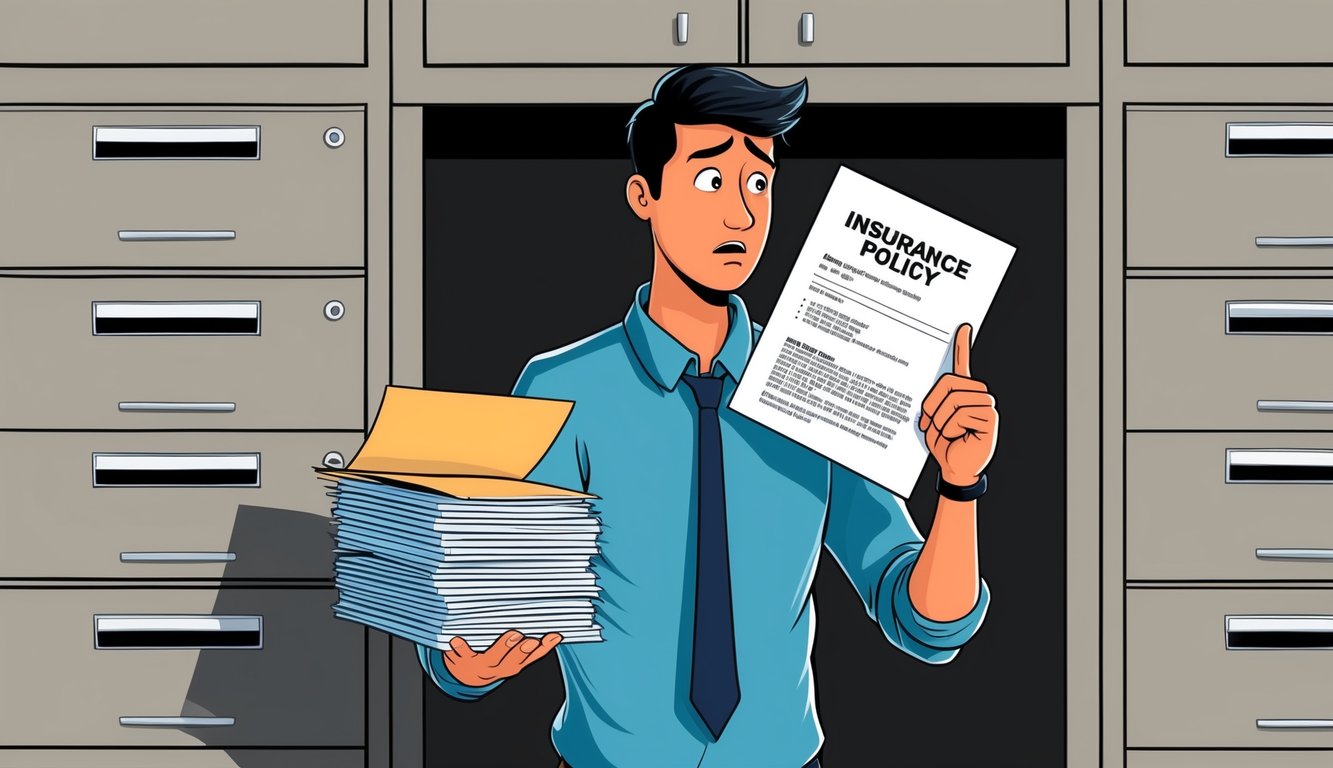Filing an insurance claim can be a complex and stressful process.
When you’re dealing with property damage, medical bills, or other unexpected expenses, the last thing you need is to make mistakes that could delay or reduce your payout.
Understanding common pitfalls and knowing how to navigate the claims process effectively can significantly improve your chances of a successful outcome. By avoiding key errors and being prepared, you can ensure that you receive the full compensation you’re entitled to under your policy.
Let’s explore some of the biggest mistakes people often make when filing insurance claims and how you can steer clear of them.
1) Not Reviewing Policy Details

Failing to review your insurance policy details is a critical mistake when filing a claim.
Many policyholders assume they know what’s covered without actually reading their policy.
This oversight can lead to unexpected denials or reduced payouts.
Your policy outlines specific coverages, exclusions, and claim procedures that you need to understand.
Before filing a claim, take time to carefully read through your policy documents.
Pay attention to coverage limits, deductibles, and any special conditions that may apply to your situation.
Understanding your policy helps you avoid common pitfalls in the claims process.
It allows you to provide accurate information and set realistic expectations for your claim outcome.
If you’re unsure about any aspects of your policy, don’t hesitate to contact your insurance agent or company for clarification.
They can explain complex terms and help you understand how your coverage applies to your specific claim.
Remember, insurance policies can change over time.
Review your policy annually and after any major life events to ensure you’re familiar with your current coverage.
2) Delaying the Claim Process
Time is of the essence when filing an insurance claim.
Procrastination can severely impact your chances of receiving fair compensation.
Many policies have strict deadlines for reporting incidents, often within 24 to 48 hours.
Waiting too long to file a claim can raise suspicions with your insurance company.
They may question why you didn’t report the damage or loss immediately, potentially leading to a denial of your claim.
Prompt reporting also allows for timely investigation and documentation of the incident.
This is especially crucial for property damage claims, where evidence can quickly disappear or deteriorate.
Delaying your claim can make it harder to recall important details.
Your memory of the event may fade, making it challenging to provide accurate information to support your case.
Insurance companies often view delayed claims as less urgent.
This can result in slower processing times and potentially reduced payouts.
By filing promptly, you demonstrate the importance of your claim.
Remember that some types of damage, like mold or water damage, can worsen over time.
Delaying your claim might lead to more extensive damage, which your policy may not fully cover.
To avoid these pitfalls, report incidents to your insurance company as soon as possible.
Keep relevant documentation handy and be prepared to provide detailed information about the event when you file your claim.
3) Incomplete Documentation
Documentation is crucial when filing an insurance claim.
Failing to provide thorough records can significantly hinder your chances of receiving fair compensation.
When submitting a claim, you need to include all relevant information about the incident or damage.
This includes detailed descriptions, photographs, and any official reports.
Keep a record of all communications with your insurance company.
Note down the names of representatives you speak with, along with dates and times of conversations.
Make sure to retain copies of any documents you send to your insurer.
This includes receipts, estimates, and repair invoices related to your claim.
If your property was damaged, take extensive photos or videos before any repairs are made.
These visual records can be invaluable in supporting your claim.
For medical claims, maintain a complete file of all treatment records, prescriptions, and bills.
Even small details can make a difference in the outcome of your claim.
Don’t forget to document any additional expenses you incur as a result of the incident.
This might include temporary housing costs or transportation expenses.
4) Ignoring Deadlines

One of the most critical mistakes you can make when filing an insurance claim is disregarding the deadlines set by your policy.
Insurance companies typically have strict time limits for submitting claims and supporting documentation.
Failing to meet these deadlines can result in your claim being denied or significantly delayed.
It’s crucial to familiarize yourself with your policy’s specific timeframes as soon as possible after an incident occurs.
Insurance policies have deadlines for filing claims and submitting necessary documentation.
These deadlines can vary depending on the type of claim and your insurance provider.
Some policies may require you to report a loss within 24 to 48 hours, while others might allow up to 30 days.
Additionally, there may be separate deadlines for submitting proof of loss or other supporting materials.
To avoid missing important deadlines, start the claims process as soon as possible after an incident.
Keep a calendar of all relevant dates and set reminders for yourself.
If you’re unsure about any deadlines, contact your insurance provider immediately for clarification.
It’s better to ask questions early than to risk having your claim denied due to missed deadlines.
Remember, meeting deadlines isn’t just about filing the initial claim.
You must also respond promptly to any requests for additional information or documentation from your insurance company.
5) Accepting Low Settlement Offers
Accepting a low settlement offer is a common mistake when filing an insurance claim.
Insurance companies often present initial offers that are well below the true value of your claim.
It’s crucial to recognize that the first offer is typically a starting point for negotiations.
Many claimants accept these low offers out of fear or urgency, potentially leaving significant compensation on the table.
Before accepting any offer, take time to assess the full value of your claim.
Consider all damages, including medical expenses, lost wages, and pain and suffering.
If you receive a low offer, don’t hesitate to counter in writing.
Provide a detailed explanation of why the offer is insufficient, supported by evidence such as medical records and expert opinions.
Remember, you have the right to negotiate.
Be prepared to present a well-reasoned counteroffer that reflects the true value of your claim.
This approach demonstrates your seriousness and can lead to more favorable outcomes.
If negotiations stall, consider seeking legal representation.
An experienced attorney can help evaluate the adjuster’s offer and craft a compelling counteroffer on your behalf.
Patience is key in this process.
Rushing to accept a low offer may leave you with insufficient funds to cover long-term expenses related to your claim.
Take the time to ensure you receive fair compensation for your losses.
6) Misunderstanding Coverage Limits
Insurance policies have specific coverage limits that define the maximum amount an insurer will pay for a claim.
Many policyholders fail to fully understand these limits, leading to unexpected out-of-pocket expenses.
It’s crucial to review your policy’s declarations page, which outlines your coverage limits for different types of losses.
Pay attention to both per-incident limits and aggregate limits for the policy period.
Some policies have sublimits for certain types of property or perils.
These sublimits cap payouts for specific items like jewelry, electronics, or cash.
Failing to recognize these can result in inadequate coverage for valuable possessions.
Replacement cost versus actual cash value is another area of confusion.
Replacement cost policies cover the full cost to replace damaged items, while actual cash value policies deduct for depreciation.
Be aware of any coinsurance clauses in your policy.
These require you to insure your property for a minimum percentage of its value.
If you don’t meet this requirement, your claim payout may be reduced.
Understanding your policy’s exclusions and limitations is equally important.
Certain types of damage or losses may not be covered at all, leaving you fully responsible for those costs.
Regularly review and update your coverage limits to ensure they align with your current needs.
Changes in property value, renovations, or acquiring new possessions may necessitate adjustments to your policy.
7) Failing to Report All Damages

When filing an insurance claim, it’s crucial to report all damages related to the incident.
You might overlook minor issues or damages that aren’t immediately apparent, which can lead to complications later.
Take time to thoroughly assess the situation and document every detail.
This includes visible damage as well as potential hidden problems that may surface later. Failing to collect enough evidence can weaken your claim.
Be sure to inspect your property or vehicle carefully.
Look for any signs of damage, no matter how small.
If you’re unsure about something, it’s better to report it than to ignore it.
Remember that some damages may not be obvious right away.
For example, after a car accident, you might notice alignment issues or strange noises days later.
In a property claim, water damage might lead to mold growth over time.
Document every aspect of the damage with photographs and detailed descriptions.
This evidence will support your claim and help ensure you receive appropriate compensation.
If you discover additional damages after filing your initial claim, report them to your insurance company immediately.
Prompt reporting increases the likelihood that these damages will be covered under your policy.
8) Not Keeping Records of Communication

When filing an insurance claim, you must keep detailed records of all communication.
Document every interaction with your insurance company, including phone calls, emails, and in-person meetings.
Note down the date, time, and content of each conversation.
This practice helps you maintain a clear timeline of events and ensures you have a reference for important information discussed.
You should also keep records of all interactions with your insurer.
Save all emails and letters related to your claim.
Create a dedicated folder or file to store these documents, making them easily accessible when needed.
If you have phone conversations, follow up with an email summarizing the key points discussed.
This creates a written record of verbal agreements or instructions.
Don’t forget to record the names and contact information of the insurance representatives you speak with.
This information can be helpful if you need to refer back to a specific conversation or clarify details.
By maintaining comprehensive records, you protect yourself from potential misunderstandings and have a strong foundation for your claim.
It also demonstrates your commitment to the process and can help expedite the resolution of your claim.
9) Forgetting to Take Photos

When filing an insurance claim, visual evidence is crucial.
Neglecting to take photos of the damage can significantly weaken your case.
Photos provide indisputable proof of the extent of the damage and its cause.
As soon as it’s safe, document everything thoroughly with your camera or smartphone.
Capture wide-angle shots to show the overall scene, as well as close-ups of specific damages.
Don’t forget to photograph serial numbers or model information for damaged items.
Taking plenty of photos is essential, but remember not to discard the damaged items.
Your insurer may need to inspect them in person.
If possible, take photos from multiple angles and in good lighting.
This helps ensure all details are clearly visible.
Include a common object for scale in some photos to give a better sense of the damage’s size.
Time-stamped photos can be particularly valuable.
They provide a clear timeline of when the damage occurred and when you discovered it.
This can be important for claims that are time-sensitive.
Remember to back up your photos securely.
Store them in the cloud or on a separate device.
This ensures you don’t lose this vital evidence if your phone or camera is damaged or lost.
10) Not Tracking Expenses

When filing an insurance claim, failing to track expenses can significantly impact your reimbursement.
Keep detailed records of all costs related to the incident.
Save receipts for temporary housing, meals, and transportation if you’re displaced from your home.
These additional living expenses may be covered by your policy.
Document repair costs meticulously.
Include receipts for materials and labor if you’re handling repairs yourself.
For professional services, obtain itemized invoices.
Create a spreadsheet or use a dedicated app to organize your expenses.
Include dates, descriptions, and amounts for each item.
This will help you present a clear, comprehensive claim to your insurer.
Don’t forget to track communication expenses.
If you need to make long-distance calls or use extra data for claim-related matters, note these costs as well.
Be aware that some policies have time limits for submitting expenses.
Check your policy details and submit your tracked expenses promptly to avoid missing out on reimbursement.
By diligently tracking all claim-related expenses, you increase your chances of receiving fair compensation.
This practice also helps you stay organized throughout the claims process.
Understanding Insurance Policies
Familiarizing yourself with your insurance policy’s details is crucial for successful claims.
Knowing what’s covered and the extent of coverage can prevent surprises during the claims process.
Reading the Fine Print
Insurance policies contain important details in the fine print.
Take time to carefully review exclusions, conditions, and limitations.
Pay attention to time limits for filing claims and any requirements for documentation.
Look for specific terms that may affect your coverage.
For example, some policies distinguish between “actual cash value” and “replacement cost.” Understanding these differences can significantly impact your claim payout.
Don’t hesitate to ask your insurer for clarification on confusing terms or clauses.
It’s better to seek explanations before you need to file a claim.
Knowing Your Coverage Limits
Your policy’s coverage limits determine the maximum amount your insurer will pay for a claim.
Be aware of these limits for different types of coverage, such as personal property or liability.
Insufficient coverage can lead to out-of-pocket expenses if your claim exceeds the limits.
Review your limits annually and adjust them as needed to account for valuable purchases or home improvements.
Consider additional coverage options for high-value items like jewelry or electronics.
Standard policies often have lower limits for these categories.
Understand how deductibles work.
Higher deductibles typically mean lower premiums, but you’ll pay more out-of-pocket when filing a claim.
Common Documentation Errors
Proper documentation is crucial when filing an insurance claim.
Errors in paperwork can lead to delays or even claim denials.
Pay close attention to detail and follow instructions carefully to avoid common pitfalls.
Incomplete Forms
Failing to provide complete information on claim forms is a frequent mistake.
Double-check that you’ve filled out every required field.
Don’t leave anything blank, even if you think it doesn’t apply.
Key areas to watch:
- Personal details (name, policy number, contact information)
- Date and time of the incident
- Detailed description of what happened
- Estimated value of damaged or lost items
If you’re unsure about a question, contact your insurance agent for clarification.
It’s better to ask than to guess or leave it empty.
Missing Attachments
Lack of proper documentation can significantly hinder your claim.
Ensure you include all necessary supporting documents with your claim submission.
Essential attachments may include:
- Photos or videos of damage
- Police reports (for theft or vandalism)
- Medical records (for injury claims)
- Receipts or invoices for repairs
- Inventory lists of damaged or stolen items
Make copies of all documents before submitting.
Create a digital backup as well.
This precaution can save you time and stress if additional copies are needed later in the process.
Communicating with Insurance Adjusters
Proper communication with insurance adjusters is crucial for a successful claim.
Your words and actions can significantly impact the outcome of your case.
Providing Accurate Information
When speaking with an insurance adjuster, always provide accurate and truthful information.
Keep detailed records of your interactions, including dates, times, and the content of your discussions.
This documentation can help prevent discrepancies later on.
Be concise and stick to the facts.
Avoid speculation or guessing about details you’re unsure of.
If you don’t know something, it’s okay to say, “I don’t know” or “I’m not certain.”
Prepare your information beforehand.
Have important documents like medical records, police reports, and photographs ready to share when requested.
Avoiding Admittance of Fault
Never admit fault or apologize when speaking to an insurance adjuster.
Even a seemingly innocent comment could be used against you to question the validity of your claim.
Stick to describing the events as they occurred without assigning blame.
Let the facts speak for themselves.
If you’re feeling emotional or overwhelmed, it’s best to postpone the conversation.
You want to remain calm and composed during these discussions.
Consider having a lawyer present or handling communications on your behalf.
This is especially important for complex claims or if you’re unsure about the process.






